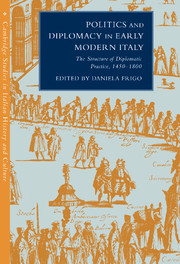Book contents
- Frontmatter
- Contents
- Introduction
- Diplomacy and government in the Italian city-states of the fifteenth century (Florence and Venice)
- Aspects of Medicean diplomacy in the sixteenth century
- An outline of Vatican diplomacy in the early modern age
- Economic and social aspects of the crisis of Venetian diplomacy in the seventeenth and eighteenth centuries
- ‘Small states’ and diplomacy: Mantua and Modena
- Neapolitan diplomacy in the eighteenth century: policy and the diplomatic apparatus
- Savoyard diplomacy in the eighteenth century (1684-1798)
- Index of names
- CAMBRIDGE STUDIES IN ITALIAN HISTORY AND CULTURE
Aspects of Medicean diplomacy in the sixteenth century
Published online by Cambridge University Press: 29 October 2009
- Frontmatter
- Contents
- Introduction
- Diplomacy and government in the Italian city-states of the fifteenth century (Florence and Venice)
- Aspects of Medicean diplomacy in the sixteenth century
- An outline of Vatican diplomacy in the early modern age
- Economic and social aspects of the crisis of Venetian diplomacy in the seventeenth and eighteenth centuries
- ‘Small states’ and diplomacy: Mantua and Modena
- Neapolitan diplomacy in the eighteenth century: policy and the diplomatic apparatus
- Savoyard diplomacy in the eighteenth century (1684-1798)
- Index of names
- CAMBRIDGE STUDIES IN ITALIAN HISTORY AND CULTURE
Summary
If diplomacy was long considered one of the formative elements of the ‘Renaissance state as the progenitor of the modern state’, it is also true that in the last few decades several commentators have complained about the noticeable malaise to which this area of study has succumbed, especially as regards the sixteenth century. The phenomenon was noted by Marino Berengo in a paper presented in 1967 to the First Congress of Italian Historians, and again some years later by Franco Angiolini,who remarked on the total lack of research on ‘non-Spanish’ Italian diplomacy and politics in the second half of the sixteenth century. For Angiolini (who also made useful suggestions for research in this area), such indifference also stemmed from the more general state of historiography of those years, as well as from the scant interest in the period.
Fifteen years later, the situation seems once again to be in movement.The considerable development of research on social and economic factors, on the political activities of the Italian states in the fifteenth and sixteenth centuries – on their institutions, but also on their power systems and apparatuses of government and court – now makes it necessary, I believe, to combine these results with those of new research on diplomacy, the aim being, as Brambilla pointed out, to establish the type and the importance of the links between ‘internal organizational forms’ and the ‘system of external dependences’.
- Type
- Chapter
- Information
- Politics and Diplomacy in Early Modern ItalyThe Structure of Diplomatic Practice, 1450–1800, pp. 49 - 94Publisher: Cambridge University PressPrint publication year: 2000
- 2
- Cited by



